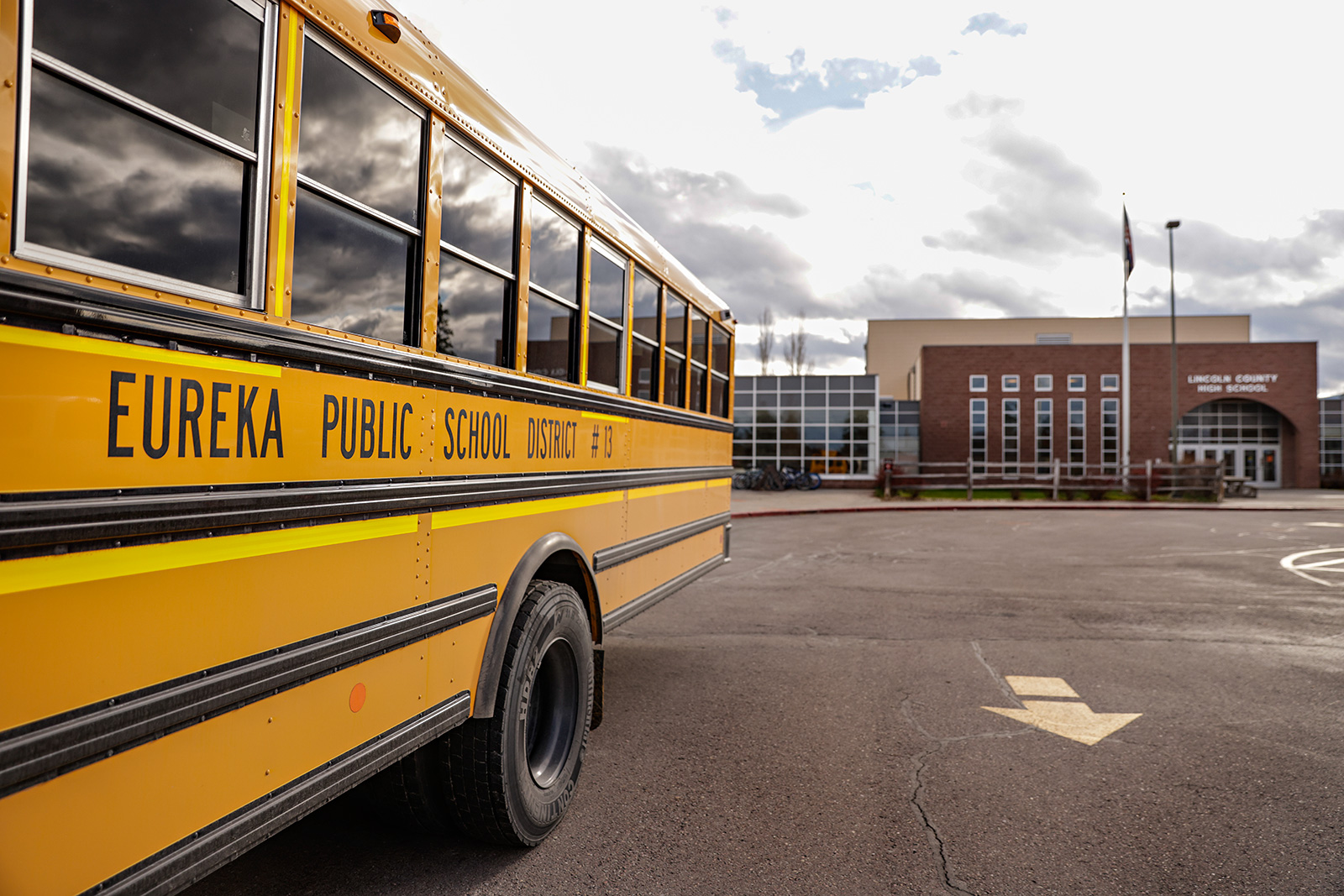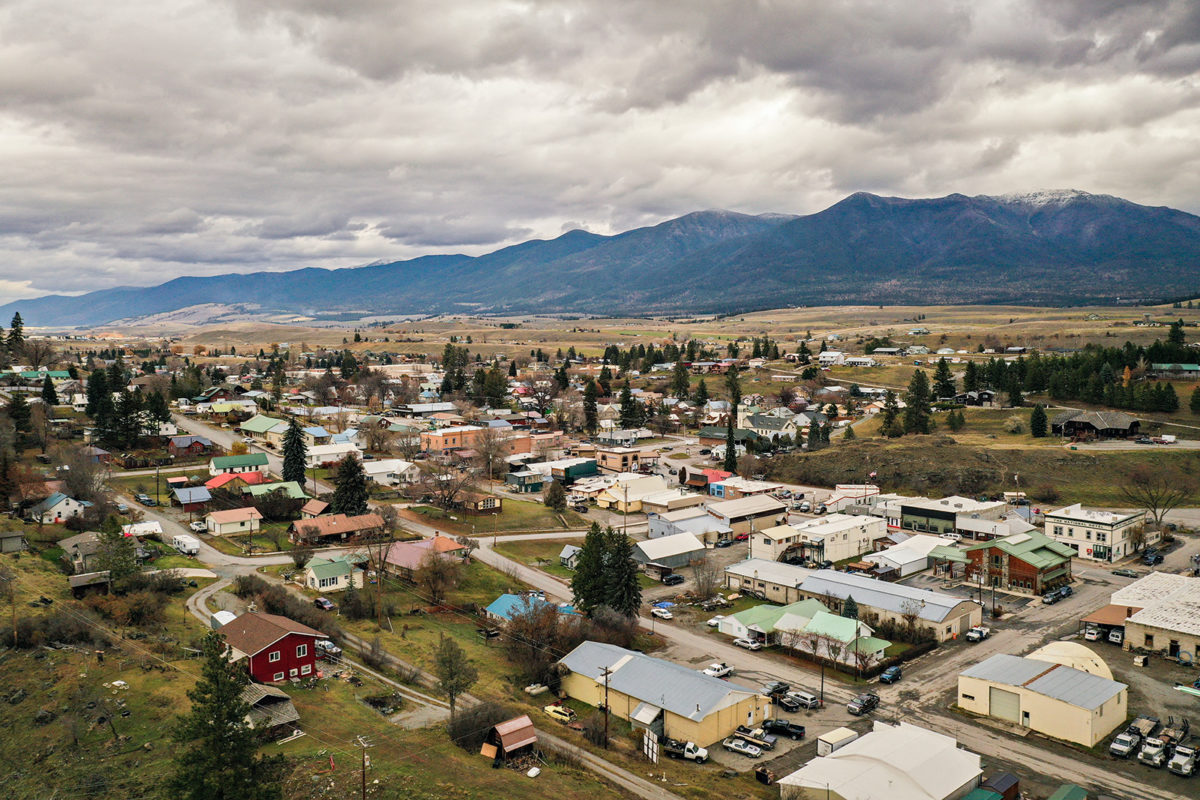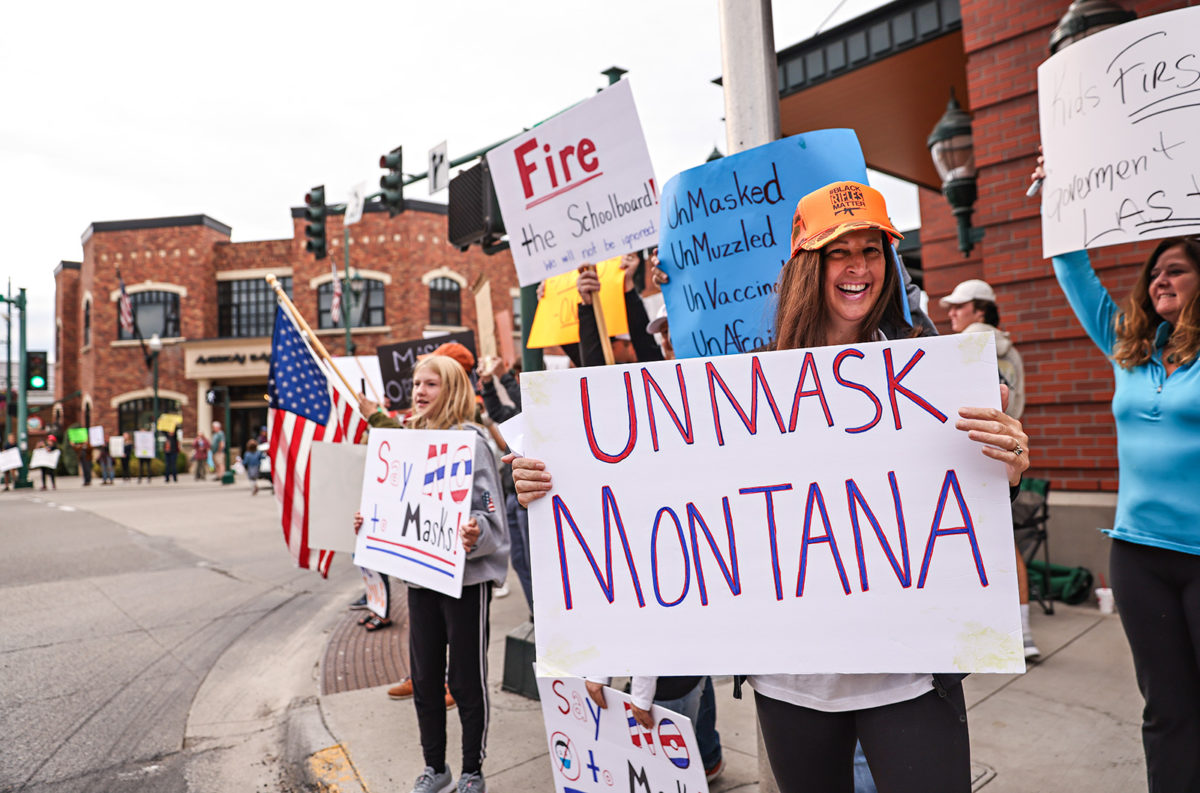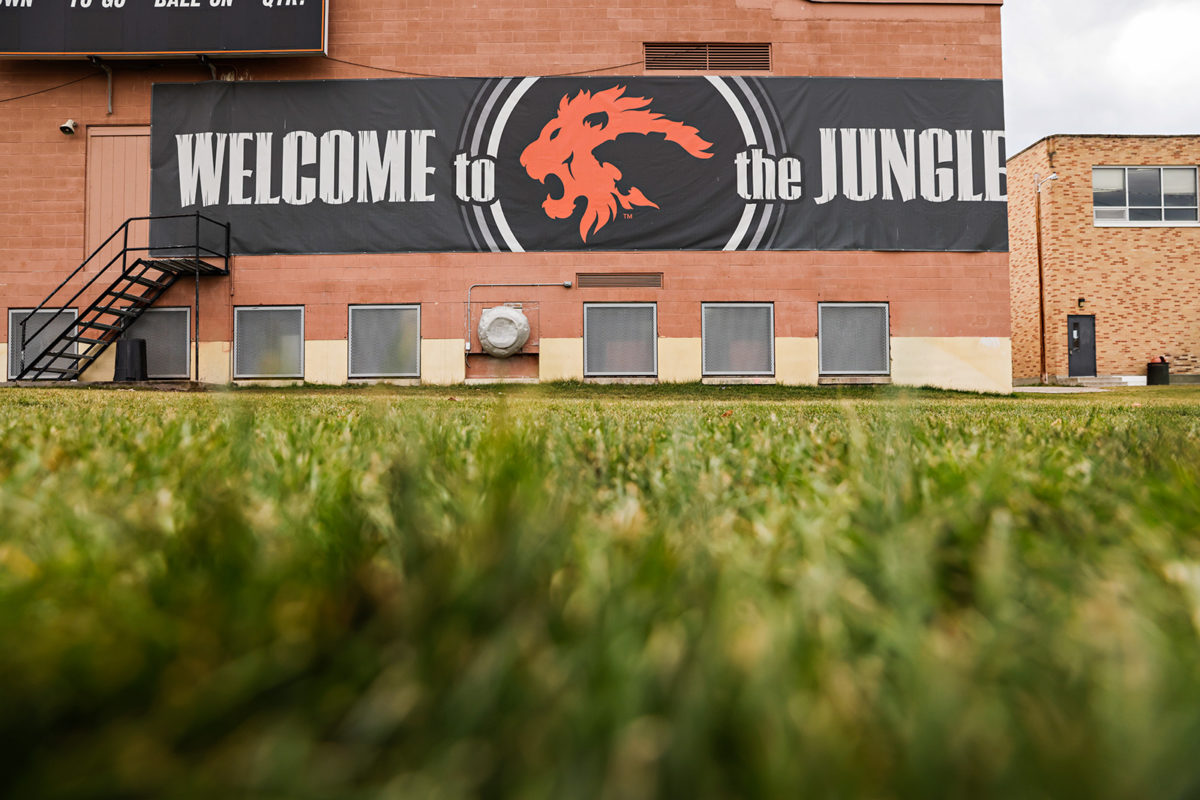‘I am Leaving the School District I Love’
As local public school boards become ground zero for contentious battles over masking policies and teaching curriculum, some longtime leaders in education are leaving their communities
By Tristan Scott
Last Saturday morning, as the intimate border community of Eureka made preparations to watch the Lions football team trounce Big Timber in the Class B quarterfinals, Superintendent of Schools Jim Mepham was busy boxing up his belongings.
He still isn’t accustomed to uttering the words “I’m leaving” out loud, such is the abruptness with which he’s decided to resign his post of 15 years. But the community backlash against school administrators has bowled him over, as even the slightest hint of COVID-19 mitigations in Eureka’s public schools has fomented such bitter divisions in this town of fewer than 2,000 people that his exasperation is taking a toll.
“I have a philosophy that I share with my teachers, which is that you take care of yourself first, and I never did that,” Mepham said. “So now I’m doing that, and it feels terrible. I am leaving a school district I love. I am moving out of a house that my wife and I planned on living in forever. We had intended to live here happily ever after, and now I’m moving to a cabin in the woods. I love this community, but I can’t live in a place where I am the former superintendent at the root of all these divisions.”
Since the onset of the pandemic, school board meetings across the country have become ground zero for the country’s culture wars, often resulting in combative and confrontational forums, with COVID-19 restrictions such as mask mandates emerging as the most prominent point of contention. Other divisive issues have surfaced, too — including a renewed focus on curriculum that includes anti-racism material — as schools and school boards become an arena for political bloodsport.
For his part, Mepham isn’t pushing a radical agenda in his district, but rather trying to maintain basic protocol and muster support for his pandemic-stricken staff without inviting backlash from a community that one teacher characterized as “proudly counter-productive to the mitigation of COVID-19.”
For example, Eureka’s public schools do not require masking in the classroom, although administrators highly recommend face coverings for all students and staff. Students and staff are required by federal law to wear masks on school buses, but even that has proven difficult to enforce.
Meanwhile, blocs of school board candidates opposed to masking have been successful in flipping boards in Lincoln County, including in Eureka Public Schools, where a crowded field of candidates entered an election shortly after the pandemic’s arrival in Montana, adding several anti-mask trustees to the mix.

From Eureka to Kalispell, critics of masking policies in schools have successfully transformed the issue into a proxy for political freedom and liberty, and the outrage it’s provoked has eclipsed Mepham’s ability to safely lead his district, he said. It’s also transformed him into a figure of malevolence in a community he deeply loves.
“I am not going to leave this community burying the hatchet, but it has been difficult,” Mepham said, acknowledging that the widening gulf in Eureka is hardly unique in Montana. “I am leaving because we have a polarized community and really because we have a polarized school board. As does Whitefish and Columbia Falls and Bigfork and everyone else. I’m not feeling sorry for myself, but the polarization in our community has made it very difficult to do what I believe is right for our students, and so has the lack of support from the board.”
Under the terms of the sale of his home, Mepham has just 30 days to move, a hastening that shrinks down even smaller in relation to the four decades of his career he’s dedicated as an educator in Montana — first as a teacher in Browning for 15 years, then as the superintendent for the Dutton/Brady School District in Teton County, and finally as superintendent of the Eureka Public School District, a job he’s held since 2006.
“I am proud of what I have done, but there is so much disagreement. Even two years ago, we could disagree with one another in this community and life would go on. Today, if you disagree with someone it turns to hatred,” Mepham said. “I can tell you all of my decisions have been based on what’s best for the students and I have no problem looking at myself in the mirror and telling myself that I made the right call on every controversial issue, and that’s because I know I was doing what was best for the kids.”
Specifically, Mepham’s administrative decisions have been based on the rampant spread of COVID-19 in Eureka schools, where by the fourth day of the current school year at least 14 staff members had tested positive for the virus, including Mepham and Eureka High School Principal Joel Graves. Meanwhile, 16 students were quarantined with positive results and three classrooms were isolated by the Lincoln County Health Department due to contact tracing.
In the absence of remote-learning protocol, however, which was due in part to several newly elected school board members’ unwillingness to consider a remote-learning alternative in the face of community opposition, the schools remained open, with approximately 70% of families opting to send their kids to class.
“The decision to stay open was based on the individual schools’ ability to run an effective school day and the communities’ choice to attend school,” Mepham wrote in a Sept. 10 Facebook post. “We also know that the number of Covid cases outside school in Lincoln County is very high and we know that the community is very polarized on this issue. At this time masks are available in every office but not required. As one of the Covid sick myself I would highly recommend masks. Masks are required on all buses both routes and activities (it’s a Federal mandate: complaints to Washington, D.C. not this FB post). Please realize that every staff member is either sick, quarantined, or overworked. We are all scared for ourselves, our families, our colleagues, our students, and our community.”
Many families in Eureka have nowhere else to send their children, Principal Graves explained at the time, highlighting an issue that often gets overlooked in urban areas that have more resources for working families.
“It would be nice to say we could just shut down all the schools and protect everyone, but not everyone has a safe place to go when schools aren’t open,” Graves said. “We’re trying really hard to stay open for those kids.”
As educators in Eureka are criticized for enacting even the most basic COVID-19 mitigation measures, a petition is underway in the progressive enclave of Whitefish to recall the entire school board following its decision to require masks for all students, staff and visitors in grades kindergarten through sixth. Across all levels of government, there have been at least 107 recall efforts related to government responses to the pandemic since 2020, though only one official was removed from office, a school trustee in Idaho who voted in the majority during a 3-1 decision to require masks in classrooms last year.
Even if the effort to recall Whitefish’s school board doesn’t produce any actionable results, as attorneys predict it won’t, and amounts to a mere “distraction,” as one trustee described the petition, it mirrors developments in other parts of the country in which school boards have become fronts to wage resentment and even threaten violence.
Organizers behind the petition are also responsible for a Facebook page that has provided a platform to organize anti-mask protests in downtown Whitefish, and which was used to broadcast the names and addresses of school board trustees, encouraging critics of the masking policy to protest in front of their homes. Although no protests were documented, the Whitefish Police Department became involved, and board members said it caused them anxiety.

As a newly elected trustee, Todd Lengacher said his overarching goal continues to be seeking common ground with critics of the district’s masking policies, as well as on other divisive issues. But he concedes that striking an accord of mutual understanding has become more elusive in the context of today’s culture wars.
“I’ve spent 20 years working in mostly private education, and as an administrator I always found that I could be effective in pulling parents and guardians into a position of compromise,” Lengacher said. “I feel like I have been less successful at that in this new political climate. People on both sides have stuck their stakes in the ground so deeply that other perspectives are being trampled. I have friends and colleagues who work in education all over the world, and they listen to the decisions we’re wrestling with in Montana over basic masking protocol and they find it laughable. But here we are.”
Earlier this year, opposition to mask mandates in Kalispell Public Schools inspired a bloc of candidates to attempt to gain seats on the district’s board of trustees, which helped keep the district’s schools open throughout the 2020-21 school year, due in part to the effectiveness of its masking policy.
The challenge brought unusual attention to the typically low-key nonpartisan races, and prompted the unusual move by the Flathead County Republicans to endorse the five challengers, while a supporter of one of the incumbents formed a political action committee to advocate on their behalf. The five incumbents attempted to tamp down the political fervor by focusing on their experience, their ability to work well together, and their commitment to putting teachers and students in the position to succeed. The challengers tried to steer the conversation away from masking, however, saying they wanted education to focus more on the Constitution, fretting over purported left-wing agendas permeating classrooms and, in one case, advocating for creationism to be taught alongside evolution.
Although the disagreements in local communities are rooted in the heated debate over face coverings and other pandemic-induced restrictions, they’ve congealed into a political platform from which the state’s top elected officials are encouraging discord while making promises to recast its laws to accommodate parents whose views don’t align with school boards’ decisions, as well as to revamp curriculum standards to omit “critical race theory.”
Earlier this year, Montana Attorney General Austin Knudsen released a legal opinion declaring some antiracism curriculum taught in public schools as “discriminatory.” And last week, Montana’s top education leader announced she’s promoting a new rule that would give parents the ability to opt out of some local school board policies, including mask requirements.
Superintendent of Public Instruction Elsie Arntzen spoke about that proposal at a rally in Missoula that generated headlines due to an attendee’s suggestion, which he later characterized as a joke, that school superintendents who don’t get on board with the policy be shot, prompting Arntzen to release a statement condemning “comments of violence” the following day.
“These types of comments serve no purpose in championing parent voice in our public education arena,” Arntzen stated. “I was unaware of the comments made after I spoke as I had moved to the hallway to take individual questions.”
For Lengacher, the Whitefish school board trustee whose address was broadcast along with those of his colleagues on social media channels, and to whom the organizers later apologized, the recent pattern of raising the specter of violence and then later apologizing for it marks a disturbing trend.
“It’s clearly part of a playbook, and what’s happening in Whitefish and other communities in Montana is happening in other states,” Lengacher said. “Threatening us and then later apologizing feels disingenuous, and I am not inclined to give anyone a free pass. People are asking for forgiveness with the assumption that they can first do whatever they want and not be held accountable for it.”
“I don’t begrudge any parents for their perspectives or desires in terms of wanting to ensure the health and wellbeing of their child,” Lengacher continued. “If they have concerns, that is fine, but what happened to calling someone and sharing those concerns in a civil manner? How did we get to this place of running people out of town and recalling people from their volunteer board positions? We just jumped over the middle ground, and I would like to see us shift back to center.”
Back in Eureka, there’s concern that Mepham’s departure, as well as the pending departures of other educators, will create vacancies that are difficult to fill.
“For one thing, we can’t afford to bring new teachers here because there’s no housing,” Mepham said. “There isn’t affordable housing within 100 miles of our community for a teacher to move into. We have been successful as a school district in part because we have been successful at growing our own teachers.”
In the current climate, however, recruitment has become a challenge.
“When I moved here, I committed to three years, and that was 15 years ago,” Mepham said. “Between myself and the three principals, we’ve each invested 15 years of our lives to this district, and that doesn’t just happen by chance. And I’m afraid that we’re breaking that up. I had a three-year contract and I am walking away before that is over, and I very much honor contracts.”

Latimer Hoke, who has a masters degree in education leadership, has been teaching at the Eureka High School for seven years, and said news of Mepham’s retirement has been a source of consternation for him and his colleagues. It came as a blow to Hoke, who doesn’t plan on returning next year to teach in Eureka, where he’s also the cross-country coach.
“Superintendent Mepham is retiring, and this alone gives a lot of people anxiety,” Hoke said. “Mr. Mepham has demonstrated through his actions over the past 15 years that he truly cares about the people who work for Eureka Public Schools. Now, with all of this pressure and negativity, maybe [the principal] resigns. Maybe a handful of great teachers leave, or the Board non-renews them against administrative recommendations. And maybe the current Board continues on their current path of regression. So I have to wonder, who the heck is going to come teach in Eureka? I mean, the mountains are nice and all, but at a certain point it’s just not worth it.”
Rita Collins, a retired teacher and longtime Eureka resident, said the community has been rocked by turbulent political climes in the past, including a period of intense fighting over environmental issues known as the “timber wars.”
But this go-round feels different, she said.
“I tend to be a community person, and I look at my community and it makes me cry,” Collins said. “Thirty years ago there was a lot of disagreement between the environmentalists and the loggers, but this feels worse. With the timber wars, I kind of understood it. I was part of an environmental group, but I could understand why people were worried about losing their jobs at the mills and their livelihood. But with what’s happening now, I don’t know where people are coming from. There’s just so much vitriol, it feels like it’s a different reality. Everything comes to pass, and this too shall pass in our community, but not without leaving some casualties.”
For Mepham, whose retirement begins in July, he’ll have plenty of time to lament the reasons for breaking his contract and abandoning the school district once he’s living in a cabin in the woods, but right now he’s more focused on meeting the 30-day deadline to move out of his house.
And yet, despite all his heartache over the issues dividing his beloved community, as a recent slate-grey Saturday morning in Eureka turned to Saturday afternoon and the Lions’ kickoff time loomed, Mepham interrupted a conversation to head to the game.
“I mean, this is the playoffs,” he said. “I’ve got to be there for these kids.”